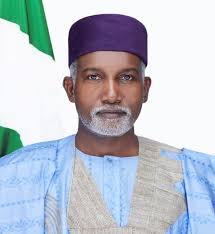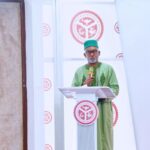Nigeria’s foreign policy direction took center stage on Friday, 12 September 2025, when the Honourable Minister of Foreign Affairs, H.E. Yusuf Maitama Tuggar, OON, delivered a landmark guest lecture at the Nigerian Institute of International Affairs (NIIA), Lagos. Speaking on the theme “Navigating Realities: Aligning Nigeria’s Foreign Policy Practice with Emerging Global Dynamics,” the Minister outlined Nigeria’s renewed approach to navigating an increasingly complex world while preserving national interest, strategic autonomy, and Africa’s collective development aspirations.
In his address, Tuggar praised the NIIA for its enduring relevance as Nigeria’s foremost think tank on international affairs, emphasizing its intellectual contributions over the past 64 years to shaping policy direction, providing research-based insights, and serving as the compass for Nigeria’s external engagements. He reminded the audience that international relations is not an abstract discipline but one meant to guide governance, diplomacy, and statecraft during moments of global flux.
The Minister highlighted the multiple transformations redefining the international system, ranging from climate change and desertification in the Sahel fueling insecurity and migration, to artificial intelligence reshaping the nature of work and warfare, and widening inequality contributing to geopolitical realignment. He cautioned that Nigeria and other medium powers must avoid being drawn into the orbit of great power competition, stressing that pressures to bandwagon with major powers were enormous but dangerous for countries with Nigeria’s size, population, and influence.
Reflecting on history, Tuggar recalled how Nigeria skillfully navigated the Cold War bipolar system through non-alignment, the concentric circles strategy, and the Concert of Medium Powers, avoiding entanglements that destabilized other nations. He pointed to landmark moments such as Nigeria’s recognition of the MPLA in Angola, its leadership at the World Conference for Action Against Apartheid, and its role during the Ogaden War, which underscored the importance of principled foreign policy grounded in intellectual depth. He further revisited the economic contestations of the 20th century between the Lagos Plan of Action and the Washington Consensus, where African nations, including Nigeria, were pressured into structural adjustment programs that undermined industrialization and deepened dependency on raw material exports.
Turning to the present, the Minister explained that the Tinubu administration’s foreign policy is anchored on the principle of Strategic Autonomy, built on four pillars he referred to as the 4Ds: Democracy, Demography, Development, and Diaspora. According to Tuggar, this approach seeks to safeguard Nigeria’s flexibility in global affairs, avoid ideological over-alignment, and instead pursue issue-based partnerships defined by shared interests and practical outcomes. He stressed that Nigeria must leverage its vast population, growing internal markets, and capacity for resilience to reposition itself as a decisive player in the multipolar order.
Tuggar clarified that strategic autonomy does not equate to duplicity but rather reflects pragmatism guided by ethics and moral principles. He reaffirmed Africa as a cornerstone of Nigeria’s foreign policy, with growing opportunities for economic integration under the African Continental Free Trade Area (AfCFTA) and the importance of cooperative defense frameworks such as the Multinational Joint Task Force (MNJTF), ECOWAS, and the African Union.
Addressing democracy, the Minister countered criticisms that Nigeria was attempting to proselytize its model of governance. He argued instead for Africa’s ownership of democracy, tailored to its history, culture, and traditions, free from the idea that any single nation holds a patent on democratic practice. He introduced the Regional Partnership for Democracy (RPD), an initiative developed by the Ministry of Foreign Affairs in collaboration with the UNDP, designed to strengthen democratic institutions, encourage dialogue even in the face of profound disagreements, and promote shared learning across the continent.
Closing his remarks, Tuggar urged Nigerians and the international community to recognize this critical moment in history as both a challenge and an opportunity. He stressed that the 21st century offers Nigeria the chance to break free from flawed self-diagnoses and seize its rightful place in shaping global governance, security, and development. By holding firmly to strategic autonomy, he concluded, Nigeria can avoid the pitfalls of past entanglements while advancing peace, prosperity, and inclusive growth both at home and across Africa.













Leave a comment